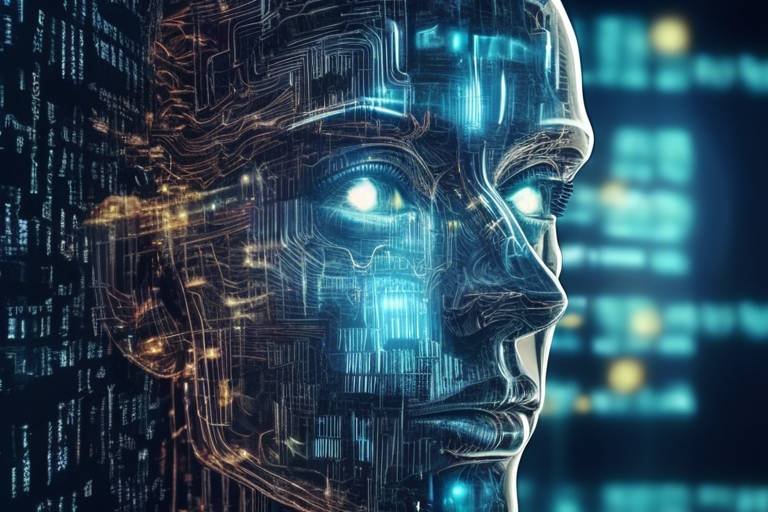The Future of AI in the Video Gaming Industry: A Preview
As we stand on the brink of a new era in video gaming, the role of artificial intelligence (AI) is becoming increasingly pivotal. Imagine a world where your gaming experience is not just a series of predetermined events, but a living, breathing ecosystem that evolves and adapts to your every move. This is not just a fantasy; it’s the reality that AI is crafting in the gaming industry. From dynamic environments that react to player actions to immersive storytelling that shifts based on choices made, the future of gaming is set to be more engaging and personalized than ever before. But what does this mean for players? Are we ready for games that learn from us, challenge us, and even understand our emotions?
In this article, we will delve into the transformative impact of AI on video games, exploring how it enhances various aspects of gameplay, storytelling, and player interaction. We'll also take a closer look at the ethical implications that come with these advancements and what trends we can expect to see in the future. Buckle up, because the gaming landscape is about to change in ways we never imagined!
AI is revolutionizing game design in ways that were once thought to be the stuff of science fiction. Gone are the days of static game worlds where every player encounters the same challenges and experiences. Now, with AI, developers can create dynamic environments that respond to player actions, making each playthrough unique. Imagine a game that adjusts its difficulty based on your skill level, ensuring that you're neither overwhelmed nor bored. This personalized gaming experience not only keeps players engaged but also encourages them to push their limits and improve their skills.
Non-player characters (NPCs) are no longer just background figures; they are becoming increasingly sophisticated thanks to AI. These characters can now exhibit realistic behaviors and learn from player interactions, making them feel more alive than ever. Picture this: you enter a bustling market in a game, and the vendors react to your presence, adjusting their prices or offering different quests based on your previous interactions. This level of detail not only enhances immersion but also contributes to richer storytelling, making players feel like their choices truly matter.
One of the most exciting developments in AI is its ability to drive procedural content generation. This technology allows developers to create vast and varied game worlds that are different every time you play. Instead of memorizing the same map or level layout, players can enjoy unique experiences with each session. This not only enhances replayability but also encourages exploration, as players are constantly discovering new elements and challenges.
Imagine a game where the narrative adapts to your choices, creating a personalized story arc that feels tailored just for you. AI can facilitate this kind of dynamic storytelling, responding to your gameplay style and decisions in real time. Whether you choose to be a hero or a villain, the game evolves, offering a narrative that reflects your journey. This level of engagement transforms gaming from mere entertainment into a deeply personal experience.
What if your game could sense your emotions? With AI's ability to analyze player emotions through biometric data or in-game actions, developers are beginning to create gameplay experiences that respond to your emotional state. A game that recognizes when you're frustrated and adjusts its challenges accordingly can lead to a more fulfilling and immersive experience. This kind of emotional intelligence in gaming is not just a gimmick; it's a way to deepen player engagement and create a more meaningful connection with the game.
The game development process is notoriously complex, but AI technologies are streamlining game testing like never before. By quickly identifying bugs and gameplay issues, AI can significantly reduce the time and resources needed for testing. This means that developers can produce higher-quality games in shorter timeframes, ultimately leading to a better experience for players. Imagine diving into a new game with fewer glitches and smoother gameplay—it’s a win-win for everyone!
As AI becomes more integrated into gaming, it also raises important ethical questions. Issues such as data privacy, algorithmic bias, and the potential for addiction are becoming hot topics of discussion. With AI systems collecting vast amounts of player data to optimize experiences, how can we ensure that this information is handled responsibly? It’s crucial for developers to establish transparent practices that protect players while still enhancing their gaming experience.
The collection of player data for AI optimization raises significant concerns about privacy and consent. Players must be informed about what data is being collected and how it will be used. Without clear communication, trust can erode, leading to a negative gaming experience. Developers need to prioritize transparency to maintain a healthy relationship with their player base.
Another critical ethical consideration is the potential for algorithmic bias in AI systems. Developers must be vigilant in ensuring that their AI does not perpetuate stereotypes or exclude diverse player demographics. By fostering an inclusive environment, developers can create fair and equitable gaming experiences that resonate with a broader audience.
AI is set to redefine multiplayer gaming in incredible ways. Imagine smarter matchmaking systems that pair you with players of similar skill levels, enhancing competition and camaraderie. Moreover, AI can facilitate better team dynamics, ensuring that players not only compete but also collaborate effectively. This level of engagement fosters a sense of community, making multiplayer experiences more enjoyable and rewarding.
- How is AI changing the way we play video games? AI enhances gameplay by personalizing experiences, improving NPC behavior, and enabling dynamic storytelling.
- What are the ethical concerns related to AI in gaming? Key concerns include data privacy, algorithmic bias, and the potential for addiction.
- Can AI create unique gaming experiences? Yes, AI can generate procedural content, ensuring that players encounter different challenges and environments each time they play.
- How does AI improve game testing? AI streamlines the testing process by quickly identifying bugs and gameplay issues, leading to higher-quality games.

Advancements in Game Design
The world of video gaming is undergoing a profound transformation, and at the heart of this evolution is artificial intelligence (AI). AI is not just a buzzword; it’s a game-changer, literally! With its ability to analyze data and learn from player behaviors, AI is paving the way for more dynamic and personalized gaming experiences. Imagine jumping into a game where the environment shifts based on your playing style, or where the difficulty level adapts seamlessly to your skills. This isn't science fiction; it's the reality that AI is bringing to the table.
One of the most exciting advancements in game design is the creation of adaptive difficulty levels. No longer do players have to face a one-size-fits-all challenge. Instead, AI can assess your performance in real-time and adjust the game's difficulty accordingly. This means that whether you’re a seasoned gamer or a newbie, you’ll find the game engaging and challenging without feeling overwhelmed. It's like having a personal coach that knows exactly when to push you harder or ease off a bit!
Furthermore, AI allows for personalized gaming experiences. Think about your favorite game and how it could be even more enjoyable if it catered specifically to your preferences. With AI, developers can analyze player data to create tailored experiences that resonate with individual gamers. For instance, if you prefer stealth over brute force, the game can adapt its scenarios to provide more opportunities for stealthy gameplay. This level of personalization not only enhances engagement but also fosters a deeper connection between the player and the game.
Moreover, the introduction of dynamic environments is another groundbreaking advancement. AI can create worlds that are not only visually stunning but also interactively rich. Imagine a landscape that changes based on the time of day or weather conditions, influencing gameplay and strategy. This level of detail immerses players in a living, breathing world, making each gaming session feel fresh and exciting.
In addition, AI-driven procedural content generation is revolutionizing how game worlds are constructed. Developers can now use algorithms to generate vast and varied landscapes, ensuring that no two gaming experiences are ever the same. This not only enhances replayability but also encourages players to explore every nook and cranny of the game. It’s like opening a new chapter in a book every time you play, where the story unfolds differently based on your choices and actions.
To summarize, the advancements in game design fueled by AI are creating a new era of gaming that is more immersive, personalized, and dynamic than ever before. As we continue to embrace these technologies, the future of gaming looks incredibly bright, promising experiences that are not just games but adventures tailored to each player's unique journey.

Enhanced NPC Behavior
Non-player characters (NPCs) have traditionally been the unsung heroes of video games, often relegated to predictable scripts and repetitive actions. However, with the advent of artificial intelligence, these characters are evolving into more dynamic and realistic entities that can significantly enhance the gaming experience. Imagine walking into a tavern in your favorite RPG, and instead of the usual static bartender who only offers the same dialogue, you encounter a character who reacts differently based on your previous interactions, the time of day, or even the choices you’ve made in the game. This is the future of NPC behavior powered by AI!
AI enables NPCs to exhibit realistic behaviors that mimic human-like responses. This means that they can learn from player actions, adapt their strategies, and even form relationships with players over time. For instance, an NPC might remember a player’s aggressive actions in a previous encounter and react defensively in future interactions. This adds a layer of depth and immersion that was previously unattainable, making players feel more connected to the game world.
Moreover, the sophistication of NPCs can lead to more immersive storytelling. When NPCs are capable of exhibiting emotions and making decisions based on player actions, the narrative becomes richer and more engaging. Players are no longer just passive participants; they become integral to the unfolding story. A well-designed NPC can evoke empathy, challenge players’ morals, and even alter the course of the game based on the player's choices.
To illustrate the impact of enhanced NPC behavior, consider the following table that highlights key attributes of traditional NPCs versus AI-driven NPCs:
| Attribute | Traditional NPCs | AI-Driven NPCs |
|---|---|---|
| Behavior | Predictable and scripted | Dynamic and adaptive |
| Memory | No memory of past interactions | Remembers player actions and choices |
| Emotional Response | Static emotional responses | Varied responses based on context |
| Story Contribution | Limited to pre-defined roles | Influences narrative based on interactions |
As we look to the future, the potential for NPCs to become even more sophisticated is exciting. Imagine a game where NPCs not only react to your choices but also have their own evolving storylines that intertwine with yours. This could lead to countless unique playthroughs, where every decision has weight and significance. The challenge for developers will be to create AI systems that can handle this complexity without compromising performance.
In conclusion, the enhancement of NPC behavior through AI is not just a technical upgrade; it’s a transformative shift that promises to make video games more engaging, personalized, and emotionally resonant. As players, we can look forward to a future where every interaction with an NPC could lead to a new adventure, a surprising twist, or a heartfelt moment.
- What are NPCs in video games?
NPCs, or non-player characters, are characters in video games that are not controlled by players. They often serve to populate the game world and provide quests or information. - How does AI enhance NPC behavior?
AI allows NPCs to learn from player interactions, adapt their behavior, and respond in more realistic ways, making the gaming experience more immersive. - Will NPCs become fully autonomous?
While AI is advancing rapidly, fully autonomous NPCs that can create their own narratives are still a concept of the future, but we are moving closer every day.

Procedural Content Generation
Procedural Content Generation (PCG) is one of the most exciting advancements brought about by artificial intelligence in the video gaming industry. Imagine diving into a game where every playthrough feels like a fresh adventure, with landscapes, quests, and challenges that are not only unique but also tailored to your gameplay style. This is where PCG shines, as it allows developers to create vast, immersive worlds that evolve and change dynamically, ensuring that players never experience the same game twice.
By leveraging algorithms to generate content algorithmically, developers can produce intricate game environments that are rich in detail and diversity. For instance, a player could explore a sprawling forest one day, only to find a bustling city filled with quests and characters the next time they log in. This unpredictability not only boosts replayability but also keeps players engaged, as they are constantly discovering new elements and storylines.
The magic of PCG lies in its ability to create content that feels organic and alive. Developers can set parameters that guide the AI in generating landscapes, enemy encounters, and even entire narratives. This means that a player’s actions and choices can lead to different outcomes, making each gaming experience personal and unique. For example, if a player favors stealth over brute force, the AI can generate missions or challenges that cater to that playstyle, enhancing the overall immersion.
Here’s a quick overview of how procedural content generation works in gaming:
| Aspect | Description |
|---|---|
| Algorithmic Design | Using mathematical algorithms to create content dynamically. |
| Randomization | Introducing randomness to ensure unique experiences every time. |
| Player-Centric Generation | Adapting content based on player choices and behaviors. |
The potential of PCG is not just limited to the environments but also extends to the narrative and quest structures within games. Imagine a role-playing game where the story branches based on your decisions, leading to multiple endings and character arcs that feel genuinely influenced by your choices. This level of interactivity and personalization has the power to transform how we think about storytelling in games, making it a collaborative experience between the player and the game itself.
However, with great power comes great responsibility. As developers harness the capabilities of procedural generation, they must also consider the balance between randomness and coherence. A world that is too random can become chaotic and disorienting, while one that is too structured may feel predictable. The key lies in finding that sweet spot where players feel both challenged and rewarded, fostering a sense of achievement as they navigate through these dynamically generated landscapes.
So, the next time you boot up a game and find yourself immersed in a world that feels alive and unpredictable, remember: it’s the magic of procedural content generation at work, powered by the incredible potential of artificial intelligence. The future of gaming is not only about playing but also about experiencing stories that adapt and evolve with you.

Dynamic Storytelling
Imagine diving into a video game where the story unfolds uniquely every time you play, shaped by your choices and actions. is no longer a mere fantasy; it's becoming a reality thanks to the advancements in artificial intelligence. This innovative approach allows games to adapt narratives based on player decisions, leading to a deeply personalized experience that resonates on an emotional level.
In traditional gaming, players often follow a linear storyline, where the outcome is predetermined. However, with the integration of AI, developers can create branching narratives that respond fluidly to player input. For instance, if a player decides to ally with a certain character, the storyline may shift to explore that relationship further, unveiling new quests and challenges. Conversely, choosing to betray that character could lead to unexpected consequences, such as facing new enemies or unlocking hidden secrets.
This adaptability not only enhances player engagement but also encourages multiple playthroughs. Gamers can explore different paths, uncovering various endings and story arcs. It’s akin to reading a book where each decision leads to a different chapter, making every playthrough a new adventure. transforms the player from a passive observer into an active participant in the narrative, fostering a deeper connection to the game's world and characters.
Moreover, AI can analyze player behavior and preferences, tailoring the narrative to suit individual styles. For example, if a player enjoys exploration over combat, the game might prioritize quests that involve discovering hidden lore rather than engaging in battles. This level of customization not only enriches the gaming experience but also ensures that every player feels their choices matter.
To illustrate the impact of , consider the following table that outlines how traditional storytelling compares to AI-driven narratives:
| Aspect | Traditional Storytelling | Dynamic Storytelling |
|---|---|---|
| Player Agency | Limited; fixed choices | High; choices affect the narrative |
| Replayability | Low; same outcome | High; multiple endings and paths |
| Character Development | Predefined arcs | Adaptive; evolves with player decisions |
| Emotional Engagement | Passive | Active; personal investment in outcomes |
As we look to the future, it's clear that will play a pivotal role in shaping the landscape of video games. By leveraging AI's capabilities, developers can craft rich, immersive narratives that not only entertain but also resonate with players on a personal level. This shift promises to redefine how we experience stories in gaming, making every adventure uniquely ours.
- What is dynamic storytelling in video games?
Dynamic storytelling refers to a narrative structure that adapts based on player choices and actions, creating a unique experience for each player.
- How does AI enhance storytelling in games?
AI analyzes player behavior and preferences, allowing narratives to shift and evolve, resulting in personalized story arcs and outcomes.
- Are there any examples of games with dynamic storytelling?
Yes, games like "The Witcher 3" and "Detroit: Become Human" feature dynamic storytelling elements that change based on player decisions.

Player Emotion Recognition
Imagine diving into a game where the storyline adapts not just to your choices but also to your feelings. Sounds like science fiction, right? Well, thanks to artificial intelligence, this is rapidly becoming a reality. Player emotion recognition is an innovative technology that analyzes players' emotional states through various inputs, such as biometric data, facial expressions, and even gameplay behavior. This capability allows games to create a more immersive and tailored experience that resonates with individual players on a personal level.
At its core, emotion recognition technology leverages sophisticated algorithms to interpret signals from players. For instance, if a player is showing signs of frustration, the game could automatically adjust its difficulty level or offer hints to help navigate challenging sections. Conversely, if a player appears to be enjoying a particular aspect of the game, the AI might amplify that experience, introducing similar elements to enhance engagement. This dynamic interaction can transform the gaming landscape, making it feel less like a mere pastime and more like a personalized adventure.
To illustrate how this technology can work, consider the following table that summarizes potential emotional responses and corresponding game adjustments:
| Emotional State | Game Adjustment |
|---|---|
| Frustration | Decrease difficulty or offer hints |
| Excitement | Introduce more challenges or rewards |
| Boredom | Change gameplay mechanics or add new objectives |
| Fear | Enhance atmospheric elements or narrative tension |
This level of interaction not only boosts player satisfaction but also fosters a deeper emotional connection to the game. Players are no longer just passive participants; they become active collaborators in their gaming experience. However, while the potential benefits are exciting, they also raise important questions about privacy and ethical considerations. How much of our emotional data are we willing to share? And how can developers ensure that this technology is used responsibly?
As we move forward, it's essential for the gaming industry to strike a balance between enhancing player experiences and maintaining ethical standards. Developers must prioritize transparency and consent when implementing emotion recognition systems. By doing so, they can create a gaming environment that respects player privacy while still delivering the dynamic and engaging experiences that modern gamers crave.
- What is player emotion recognition?
Player emotion recognition is a technology that analyzes players' emotional states to adapt gameplay and enhance their experience. - How does it work?
It uses data from biometric sensors, facial recognition, and gameplay behavior to interpret emotional signals and adjust game elements accordingly. - What are the benefits of this technology?
It creates a more immersive and personalized gaming experience, allowing games to respond dynamically to players' emotional states. - Are there any ethical concerns?
Yes, issues such as data privacy and consent are significant. Developers must ensure transparent practices when using emotion recognition technology.

AI in Game Testing
Imagine a world where game testing is as seamless and efficient as playing the actual game. With the advent of artificial intelligence, this dream is becoming a reality. AI technologies are revolutionizing the game testing process, allowing developers to identify bugs and gameplay issues with unprecedented speed and accuracy. No longer do testers have to spend countless hours manually sifting through lines of code or endlessly replaying levels to catch that one elusive glitch. Instead, AI can take on these tasks, freeing up human testers to focus on more creative aspects of game development.
One of the most significant advantages of using AI in game testing is its ability to analyze vast amounts of data in real-time. By employing machine learning algorithms, AI can learn from previous testing sessions and adapt its strategies for future tests. This means that not only can it identify existing bugs, but it can also predict where new ones might arise, offering developers a proactive approach to quality assurance. This predictive capability is akin to having a crystal ball for game development, allowing teams to anticipate issues before they become major headaches.
Moreover, AI can simulate player behavior by generating countless virtual players that mimic real human interactions. These AI-driven players can explore every nook and cranny of the game world, testing various scenarios and gameplay mechanics. This process not only uncovers bugs but also provides valuable insights into how players might interact with the game. It’s like having an entire army of testers at your disposal, tirelessly working to ensure that every aspect of the game is polished and ready for launch.
In addition to enhancing efficiency, AI in game testing can also improve the overall quality of games. By catching bugs early in the development cycle, developers can implement fixes before they escalate into more significant issues. This leads to a smoother gaming experience for players and reduces the likelihood of post-launch patches that can frustrate gamers. In essence, AI is not just a tool for testing; it’s a partner in creating a more engaging and enjoyable gaming experience.
However, the integration of AI into game testing is not without its challenges. Developers must ensure that the AI systems they deploy are reliable and accurate, as any flaws in the AI could lead to missed bugs or false positives. Additionally, there is a need for a balance between automated testing and human oversight to maintain the creative aspects of game design. After all, while AI can analyze data and predict outcomes, it lacks the intuition and creativity that human testers bring to the table.
As we look to the future, it’s clear that AI will play an increasingly vital role in game testing. Developers who embrace these technologies will likely find themselves at a significant advantage, able to deliver higher-quality games more efficiently. The result? A gaming landscape that is not only more innovative but also more enjoyable for players everywhere.
- What are the main benefits of using AI in game testing?
AI improves efficiency, enhances quality assurance, and allows for predictive analysis of potential bugs. - Can AI completely replace human testers?
No, while AI can automate many tasks, human intuition and creativity are essential for a comprehensive testing process. - How does AI simulate player behavior?
AI generates virtual players that mimic real human interactions, exploring different scenarios to identify bugs and gameplay issues. - What challenges come with integrating AI into game testing?
Reliability of AI systems, potential for missed bugs, and the need for human oversight are key challenges developers face.

Ethical Considerations
As artificial intelligence (AI) continues to weave itself into the fabric of the video gaming industry, it's crucial to pause and reflect on the ethical implications that come along with these advancements. The integration of AI not only enhances gameplay but also raises significant questions about data privacy, algorithmic bias, and even the potential for addiction. These issues are not just technical challenges; they are moral dilemmas that developers, players, and stakeholders must navigate carefully.
One of the most pressing concerns is data privacy. With AI systems relying on vast amounts of player data to optimize experiences, the question of how this data is collected, stored, and utilized looms large. For instance, when players engage with a game, their actions can be tracked and analyzed to tailor content to their preferences. While this creates a more personalized experience, it also raises concerns about consent. Are players fully aware of the extent to which their data is being used? Developers must prioritize transparent practices that protect players while still enhancing their gaming experience. This means implementing clear privacy policies and giving players control over their data.
Another critical ethical consideration is algorithmic bias. AI systems can inadvertently perpetuate stereotypes or exclude certain demographics if not designed thoughtfully. For example, if a game's AI is trained on biased data sets, it may lead to NPCs that reinforce negative stereotypes or fail to represent the diversity of the player base. Developers must be vigilant in auditing their AI systems to ensure they are fair and inclusive. This involves actively seeking diverse perspectives during the development process and continuously testing AI behavior to eliminate biases.
Moreover, as games become more immersive and engaging, the risk of addiction also increases. AI can create highly addictive gameplay loops that keep players coming back for more, sometimes at the expense of their well-being. It's essential for developers to strike a balance between creating engaging experiences and ensuring players' mental health is prioritized. Implementing features that encourage breaks or limit playtime could be vital in fostering a healthier gaming environment.
To illustrate these ethical considerations, consider the following table that outlines the key issues and potential solutions:
| Ethical Issue | Description | Potential Solutions |
|---|---|---|
| Data Privacy | Concerns about how player data is collected and used. | Transparent privacy policies, player control over data. |
| Algorithmic Bias | Risk of reinforcing stereotypes or excluding demographics. | Diverse data sets, regular audits of AI behavior. |
| Addiction | Highly engaging gameplay can lead to excessive play. | Features that encourage breaks, limit playtime. |
In conclusion, as we embrace the future of AI in gaming, it's imperative to address these ethical considerations head-on. By fostering a culture of responsibility and transparency, we can ensure that the gaming industry thrives while prioritizing the well-being of its players. The conversation around ethics in AI is just beginning, and it will be fascinating to see how developers respond to these challenges in the years to come.
- What are the main ethical concerns regarding AI in gaming? The primary concerns include data privacy, algorithmic bias, and the potential for addiction.
- How can developers ensure data privacy? Developers can prioritize transparent practices and give players control over their data.
- What steps can be taken to address algorithmic bias? Regular audits of AI systems and using diverse data sets are essential.
- How can gaming addiction be mitigated? Implementing features that encourage breaks and limit playtime can help maintain a healthy gaming environment.

Data Privacy Issues
As we embrace the incredible advancements in artificial intelligence within the gaming industry, one pressing issue looms large: data privacy. With AI systems collecting vast amounts of player data to enhance gaming experiences, the question arises: how safe is this data? Players often unknowingly provide personal information, from gameplay habits to biometric data, which can be harvested and analyzed to tailor experiences. While this can lead to more immersive gameplay, it also raises significant concerns about who has access to this data and how it is being used.
Imagine you're playing your favorite game, and suddenly, it feels like the game knows you better than your closest friends. It knows when you're frustrated or excited and adjusts the gameplay accordingly. Sounds amazing, right? But at what cost? The collection of such sensitive data can lead to potential misuse, where malicious entities might exploit this information for nefarious purposes. Therefore, game developers must prioritize transparency and player consent in their data collection practices.
To navigate this complex landscape, developers need to establish clear guidelines regarding data usage. Here are some key points to consider:
- Informed Consent: Players should be made aware of what data is being collected and how it will be used.
- Data Security: Implementing robust security measures to protect player data from breaches is crucial.
- Player Control: Giving players the option to opt-out of data collection or delete their data can empower them and build trust.
Moreover, regulatory frameworks are emerging globally to address these concerns. For instance, the General Data Protection Regulation (GDPR) in Europe sets strict guidelines on data collection and usage, ensuring that players have rights over their personal information. As these regulations evolve, the gaming industry must adapt to comply with them, balancing innovation with ethical considerations.
In conclusion, while AI has the potential to revolutionize gaming, the protection of player data must be a top priority. Developers should strive to create a safe gaming environment that respects player privacy while still delivering personalized experiences. After all, a game is only as enjoyable as the trust between the player and the developer.
- What types of data do games collect? Games often collect data on player behavior, preferences, and sometimes biometric data such as heart rate or facial expressions.
- How can I protect my data while gaming? Always read the privacy policy, opt-out of data collection when possible, and use strong passwords for your gaming accounts.
- Are there regulations protecting my data? Yes, regulations like GDPR in Europe protect player data and give individuals rights over their personal information.

Addressing Algorithmic Bias
As artificial intelligence continues to weave itself into the fabric of the gaming industry, one pressing issue that developers must confront is algorithmic bias. This bias can manifest in various forms, often leading to unfair or stereotypical representations of characters and scenarios within games. Imagine playing a game where certain character traits or abilities are disproportionately assigned based on gender, race, or other demographics. Not only does this undermine the immersive experience, but it also risks alienating a significant portion of the player base.
To combat this issue, developers must take a proactive approach in identifying and mitigating biases in their AI systems. This involves a multi-faceted strategy that includes:
- Data Diversity: Ensuring that the datasets used to train AI models are diverse and representative of various demographics. This means including voices and perspectives from all corners of society, thus avoiding the reinforcement of stereotypes.
- Regular Audits: Conducting frequent audits of AI algorithms to detect biases early on. By analyzing how AI makes decisions and the outcomes it produces, developers can identify patterns that may indicate bias.
- Inclusive Design Teams: Building diverse teams of developers and designers who can bring different perspectives to the table. This not only helps in recognizing potential biases but also fosters a more inclusive gaming environment.
Moreover, the importance of community feedback cannot be overstated. Engaging with players from various backgrounds and encouraging them to share their experiences can provide invaluable insights into how AI systems are perceived and how they affect gameplay. By creating an open dialogue, developers can adapt their designs to better serve their audience.
Ultimately, addressing algorithmic bias is not just a technical challenge but a moral imperative. The gaming community thrives on diversity, creativity, and inclusivity, and it is the responsibility of developers to ensure that their games reflect these values. By actively working to eliminate biases, the industry can pave the way for more equitable and enjoyable gaming experiences for everyone.
- What is algorithmic bias in gaming? Algorithmic bias refers to the unfair treatment or representation of certain groups or individuals in video games due to biased data or flawed AI algorithms.
- How can developers address algorithmic bias? Developers can address algorithmic bias by ensuring diverse data sets, conducting regular audits of their AI systems, and fostering inclusive design teams.
- Why is it important to address algorithmic bias? Addressing algorithmic bias is crucial for creating fair, inclusive, and enjoyable gaming experiences that reflect the diversity of the player base.

The Future of Multiplayer Experiences
The world of multiplayer gaming is on the brink of a major transformation, thanks to the integration of artificial intelligence. Imagine a gaming universe where your teammates are not just programmed characters but rather intelligent entities that learn and adapt to your playstyle. This evolution will not only enhance the gameplay experience but also foster a sense of community and collaboration among players. AI is set to redefine how we interact, strategize, and compete in multiplayer environments.
One of the most exciting advancements is in smart matchmaking. Gone are the days of being paired with players who are either way too skilled or just starting out. With AI-driven matchmaking systems, players will be grouped based on a variety of factors, including skill level, playstyle, and even emotional state. This means that every match will feel balanced and fair, creating a more enjoyable experience for everyone involved. Imagine jumping into a game where your opponents are just as skilled as you, leading to thrilling and competitive matches!
Furthermore, AI can enhance team dynamics by analyzing players' behaviors and suggesting optimal strategies. For instance, if a player struggles in a specific role, the AI can recommend adjustments to their gameplay style or even suggest teammates who excel in that area. This not only helps players improve but also builds a more cohesive team environment. In essence, AI acts as a coach, guiding players to maximize their potential.
Another fascinating aspect of AI in multiplayer gaming is its ability to create more engaging social interactions. With AI systems capable of understanding player emotions and reactions, games can now offer personalized experiences that resonate on a deeper level. For example, if a player is feeling frustrated, the game might adjust the difficulty or provide hints to help them along. This responsiveness fosters a sense of empathy within the gaming experience, making players feel more connected to both the game and their fellow players.
Moreover, the future of multiplayer experiences is not just about competition; it’s also about community building. AI can facilitate in-game events or challenges that encourage players to collaborate rather than compete, fostering friendships and alliances. Imagine participating in a massive multiplayer event where teams must work together to achieve a common goal, all while AI monitors and adjusts the challenges based on player performance. This not only enhances the sense of community but also keeps players engaged and invested in the game world.
As we look ahead, it's clear that the integration of AI into multiplayer gaming will lead to a more immersive, engaging, and socially connected experience. Players will not only enjoy the thrill of competition but also the joy of building relationships and collaborating with others. The future is bright, and the possibilities are endless!
- How will AI improve matchmaking in multiplayer games?
AI will analyze various factors such as player skill levels, playstyles, and emotional states to create balanced matches, ensuring a fair and enjoyable gaming experience. - Can AI help players improve their skills?
Yes, AI can provide personalized feedback and suggest strategies based on individual player performance, helping them to enhance their skills over time. - What role does AI play in fostering community within games?
AI can create events and challenges that encourage collaboration among players, promoting friendships and alliances rather than just competition.
Frequently Asked Questions
- How is AI changing game design?
AI is transforming game design by enabling dynamic environments, adaptive difficulty levels, and personalized experiences. This means that games can adjust to your unique play style, making them more engaging and tailored just for you!
- What improvements are being made to NPC behavior?
Non-player characters (NPCs) are becoming smarter thanks to AI. They can now learn from your actions and exhibit more realistic behaviors, which enhances immersion and storytelling in games. Imagine NPCs reacting to your choices as if they were real people!
- What is procedural content generation?
Procedural content generation is a technique where AI creates vast and varied game worlds automatically. This means you can enjoy unique experiences every time you play, making exploration feel fresh and exciting!
- How does AI contribute to dynamic storytelling?
AI allows narratives to adapt based on your choices, creating personalized story arcs that respond to your gameplay style. This means your decisions truly matter and can lead to different outcomes, making each playthrough unique!
- Can AI recognize player emotions?
Yes! AI can analyze player emotions through biometric data or in-game actions, allowing games to adjust gameplay based on how you're feeling. This enhances engagement and makes for a more immersive experience.
- How does AI improve game testing?
AI streamlines the game testing process by quickly identifying bugs and gameplay issues. This results in higher-quality games and more efficient development cycles, ensuring that you get the best gaming experience possible!
- What ethical concerns are associated with AI in gaming?
As AI becomes more integrated into gaming, concerns about data privacy, algorithmic bias, and potential addiction arise. It's crucial for developers to address these issues to ensure responsible AI use in the industry.
- How is player data used in AI optimization?
Players' data is collected to optimize AI systems, but this raises concerns about privacy and consent. Developers must practice transparency to protect players while still enhancing their gaming experiences.
- What is being done to address algorithmic bias?
Developers are becoming more aware of algorithmic bias in AI systems and are working to ensure fair and inclusive gaming experiences. This involves avoiding stereotypes and ensuring diverse representation in games.
- How will AI redefine multiplayer experiences?
AI is set to enhance multiplayer gaming through smarter matchmaking, improved team dynamics, and more engaging social interactions. This fosters a sense of community and collaboration among players, making multiplayer experiences more enjoyable!


















